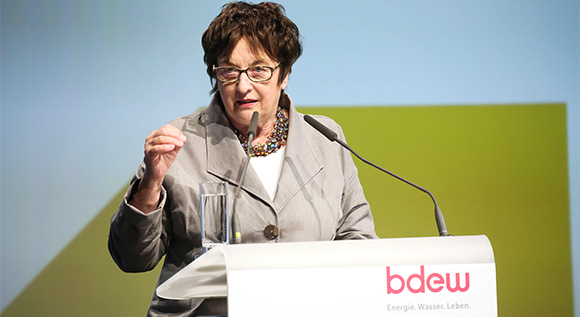Minister Zypries: "No other development will have as strong an impact on the energy transition as digitisation"
Laying the foundations for the energy system of the future: Federal Minister for Economic Affairs, Brigitte Zypries, speaking about the challenges facing the next parliament.
 © BDEW
© BDEW
"There is no other development that will have as strong an impact on the energy transition as digitisation", stated Federal Economic Affairs Minister Brigitte Zypries in a speech she gave at the Convention of the German Association of Energy and Water Industries (BDEW) on 21 June. She went on to say that it was the task of the Federal Ministry for Economic Affairs and Energy to ensure that the energy transition meets the needs of an industrialised country venturing into the age of digitisation. She said that Germany's future energy system will require digital solutions enabling generators to be smartly interconnected with consumers or storage sites. Furthermore, she said, digital solutions were also needed to ensure that efficiency targets are met.
Fresh prospects for startups and established companies
The minister stated that the Bundestag, in adopting the Law on the Digitisation of the Energy Transition, had created a stable framework for digital change in the energy sector, which will allow Germany to harness its digital potential in this field. She said that digitisation would allow for new business models to be developed – not only by large energy companies, but especially by startups. Ms Zypries said that bringing together young companies with well-established ones is the most promising approach in terms of economic success. She went on to introduce the "Future Energy Accelerator", a new programme developed in cooperation with the German Energy Agency, which is designed to deliver targeted support to innovative energy startups.
Bringing the energy transition to every sector
The Economic Affairs Minister also spoke about the potential for greater sector coupling and its benefits. She explained that decarbonisation within the power sector had progressed very well already, meaning that fossil fuels are being replaced with renewables. "Now we need to take what has so far been an electricity transition to the next level, making it a full energy transition that extends to all sectors", Ms Zypries said. She explained that greater use needs to be made of electricity from renewables in the heat and transport sectors, which will help to decarbonise these sectors in an indirect way (please follow this link for more information on sector coupling). The minister said that the current system of fees, charges and surcharges stands in the way of well-functioning sector coupling. She announced that, after the Bundestag elections in September, the Federal Ministry for Economic Affairs and Energy will be launching an open debate about necessary reforms in this area.
Reduced funding costs thanks to disciplining effects of competition
"We have achieved quite a bit during this parliament", said Minister Zypries. "Our goal was to make greater use of competition and the market economy so as to stop the costs from rising further". The minister said that the auctions conducted during the present parliament had shown that this goal had been achieved. Three out of four offshore projects for which auctions have been held were awarded to operators claiming 0 cents of funding per kilowatt hour. "It is unlikely that we would have had bids for 0 cents without the disciplining effect of competition", said the minister, who went on to say that she was just as pleased about the outcomes of the first round of auctions for onshore wind energy, which saw not only large companies, but many citizens' energy undertakings being awarded contracts (for more details, please click here). Ms Zypries concluded that the paradigm shift introduced with the 2017 version of the Renewable Energy Sources Act had been the right way forward.

